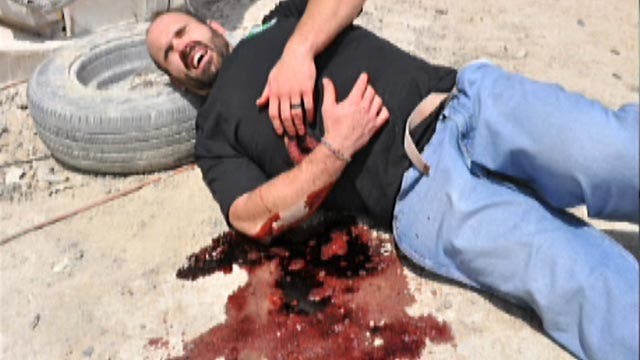War Games: Special-effects training preps med students
Defense Specialist Allison Barrie discusses next gen training for military medics using hyper-realistic scenarios
Active shooters. Rocket-propelled grenades. Improvised explosive devices. Car crashes.
You see them in war. You see them in law enforcement. And you see them on the silver screen.
So could there be a better place to train medical personnel than Hollywood?
Second-year students from Rocky Vista University’s College of Osteopathic Medicine have been training for life-or death emergencies this week with staff from Balboa Naval Hospital.
They’re taking an Intensive Surgical Skills course run by San Diego-based Strategic Operations Inc., which for more than 10 years has leveraged Hollywood special effects to provide realistic training to more than 750,000 military personnel and domestic first responders.
Research shows soldiers have a higher rate of casualties in their first few combat missions, and it is believed the rate can be lowered by reducing the fear of the unknown and unexpected.
So cue the fake blood. Students taking the Intensive Surgical Skills course practice in realistic environments, including a hospital with emergency and surgery rooms. Simulating actual emergencies, “wounded” role players display pain, fear, hysteria and confusion and they provide misinformation, giving the students a chance to experience the stress of combat trauma care.
Senior medical professionals from Balboa Naval Hospital, Wake Forest University, University of Colorado, University of Nevada, Arizona State University and the Naval Health Research Center are on hand to observe and assist.
Last week, three Americans, including a Chicago pediatrician, were shot dead at a hospital in Kabul. So on Monday, Strategic Operations began this week’s course with a session designed for that sort of scenario: an active shooter in a hospital.
On Tuesday, there was a simulated MedCap (Medical Civic Action Program) visit to an Afghan village, where a team of doctors was ambushed with IEDs and an RPG attack. Later in the day, they grappled with multiple casualties from a downed helicopter.
On Wednesday, MedCap visited another “Afghan village” and encountered multiple active shooters. Later, using Strategic Operations’ ship simulator, they dealt with casualties from a USS Cole-type attack
On Thursday, the Federal Fire Department, San Diego Police Department and the San Diego SWAT team were to join the medical students in responding to a car accident, complete with explosions and smoke and multiple injuries.
Realistic Battlefield Effects
In order to prepare the students, Strategic Operations combines state-of-the-art Hollywood special effects, role players, subject matter experts, combat wound effects and medical simulation systems like its 35-pound “Cut Suits,” which provide the look, feel and smell of severe traumatic events.
“The more realistic the training, the better the body adapts to stress, resulting in ‘stress inoculation,’” says the company’s executive vice president, Kit Lavell.
“Why? Repetitive practice in a hyper-realistic simulation makes practice perfect. Perfect practice makes perfect results – peak performance.”
The “Cut Suits” help doctors and first responders learn how to perform procedures on victims at the point of injury, how to hone treatment en route to a hospital or medical outpost and how to intervene surgically when necessary.
The students have to contend with realistic head wounds, penetrating chest wounds, burns and shrapnel. And they have to do it in realistic combat conditions – under AK-47 and RPG fire – that are replicated by Strategic Operations.
Makeup artists create combat wounds that bleed actively from hidden tubes and stop only when a tourniquet is properly applied. If compression is ineffective, the bleeding continues.
The company’s combat wound kit offers a remarkable range of realistic simulations, from penetrating shrapnel wounds, traumatic hand amputation and sucking chest wounds to upper extremity third-degree burn, gunshot exit wounds and second-degree partial thickness burn.
A self-contained Blood Pumping System, worn and controlled by a player, can deliver four simultaneous three-liter arterial and venous bleeds. It is designed to help participants master hemorrhaging risks, which is critical because uncontrolled hemorrhaging plays a serious role in patient survivability.
Participants also may wear uniforms, body armor and equipment over a 20-pound Tactical Combat Casualty Care system designed to teach medics how to deal with the three primary causes of death on the battlefield.
“In medical training, the result is that the first exposure to real-world trauma proves to be no worse than the last hyper-realistic simulation,” Lavell says. “Hyper-realistic training saves lives.”









































